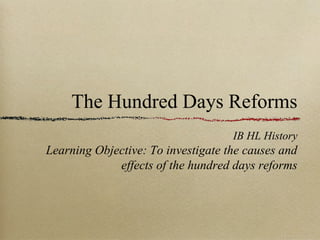
The Causes and Effects of Failed Reform
- 1. The Hundred Days Reforms IB HL History Learning Objective: To investigate the causes and effects of the hundred days reforms
- 2. The Background Causes • Calls for institutional reform • Failure of the Self-Strengthening Movement • The introduction of Western ideas of reform • Progressive-minded young intellectuals • The effects of the Sino-Japanese War • The effects of the Scramble for Concessions • Political struggle within the Qing court
- 3. Reasons for Reform • Institutional reform and other changes would strengthen China's defence against Western imperialism. • A new educational structure would replace the old, traditional one, • The political system would be re-organized to achieve a greater degree of efficiency.
- 4. Other Reasons • The reform movement was also part of the struggle for power within the Qing court. • The young scholar-reformers advocated reform out of patriotic reasons, and to advance to positions of power in the government.
- 5. The Reforms Begin • Last from June to September 1898, • Some 200 or so reform decrees were issued in quick succession. • A wide-reaching program for 'reform of institutions' was attempted. • Too much, too late?
- 6. Education Reforms • Abolition of the 'Eight-legged essay' in the Civil Service Examinations. Introduction of a new syllabus based on current political and economic problems. • Introduction of an exam on political economy. Establishment of an Imperial University in Peking. Founding of a medical school. • Establishment of primary and secondary schools in the provinces
- 7. Government administration • Appointment of reform-minded officials. Introduction of stricter discipline for civil servants. Measures to check corruption and sinecures. • Improvement in administrative efficiency, simplified procedures. Creation of 12 new Ministries to replace the old 6 Boards • Encouragement of reform suggestions from private citizens.
- 8. Q1 How would you best summarize the reasons for the Hundred Days reforms?
- 9. Begins to Unravel • Too radical for the Empress Dowager • Sees it as an attempt to take power from her • Yuan Shikai involved • Emperor imprisoned and probably poisoned • Orders issued to arrest Kang and the reformers • Kang’s writing banned • 6 martyrs (including Kang’s brother)
- 10. Q2 Why did it fail?
- 11. Reasons for Failure 1: Inexperience • Age of reformers • No knowledge of the West • No knowledge of power politics • Didn’t consider consequences e.g.: abolition of 8-Legged essay made students unhappy
- 12. Reasons for Failure 2: Power of Tz’u-Hsi • Had been the boss for 37 years • Experienced and embedded in power • Still controlled grand council • Had control of Jung-Le’s troops
- 13. Reasons for Failure 3: Conservative Opposition • Saw Kang’s interpretation of Confucius as blasphemy • Even moderates couldn’t accept it
- 14. Reasons for Failure 4: Speed of Reforms • Reforms are rushed through and a flurry of edicts comes from the court • Implementation was almost impossible due to the speed • No attempt to build capacity lower down the imperial administration or clarify exactly what was wanted
- 15. Q3: Develop a hypothesis-What will be the consequences of reform failure?
- 16. Consequence 1 • Progressive reform from the top down now impossible (for a while)
- 17. Consequence 2 • Reactionary court incapable of leadership
- 18. Consequence 3 • Reactionary court leads to anti foreignism and the Boxer rebellion
- 19. Consequence 4 • Relations between Han and Manchu damaged as court pursue anti Chinese policy to punish reformers • Kang-I “ Reform benefits the Chinese but hurts the Manchus. If I have properties, I would rather give them to my friends than let the slaves share the benefit”
- 20. Consequence 5 • Relations between Han and Manchu damaged as court pursue anti Chinese policy to punish reformers
- 21. Consequence 6 • An increasing amount of Chinese begin to see that the only path forward is revolution from below • Enter Dr Sun Yat Sen
Notas do Editor
- The MC reforms weren’t actually due to be reviewed until 1929 but Lord B brought it forward for political reasons as he thought a Labour government likely
- K'ang Yu-wei, however, expected more changes. He intended to establish a constitutional and parliamentary government for China. All other reform measures, to K'ang, were secondary to political modernization.
